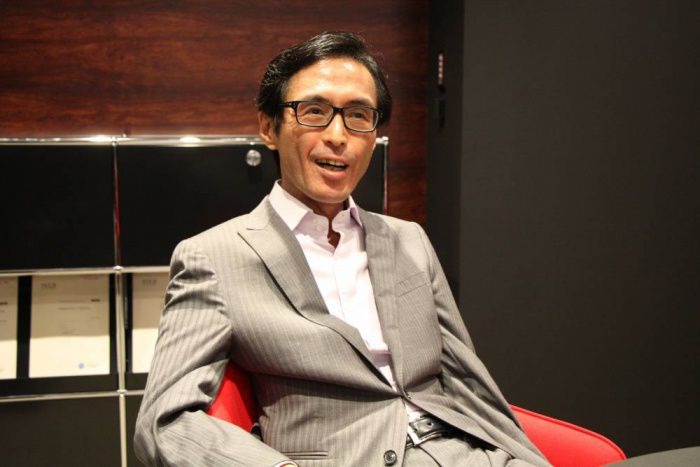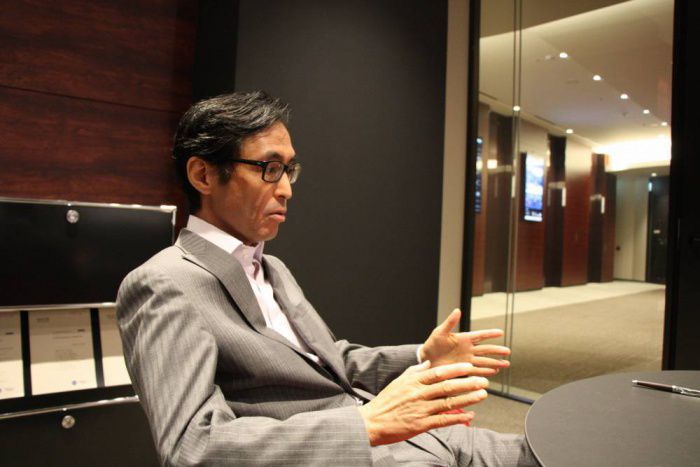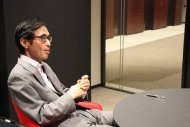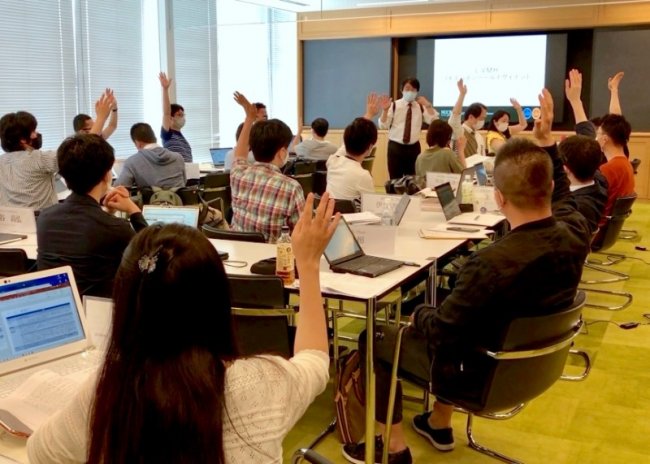Dr. Seiichiro Iwasawa, Professor, Graduate School of Management
Professor Iwasawa, who specializes in behavioral economics, is a practitioner who has worked as an analyst and strategist at Nomura Research Institute and Nomura Securities. Professor Iwasawa, who is popular among students for his light-hearted talk, talked to us about "being a strategist" and "what he liked when he was a student.
Interviewed: September 2015
Interviewed by: NUCB Business School Public Relations
I wanted to study properly again, so I went to Harvard.
Please tell us about your background and how you got your MBA.
About three years after I joined Nomura Research Institute, I took an international student exam and was fortunate enough to pass, so the company paid for me to go and study abroad, which was my first experience. At that time, I went to Boston University to get my MBA. I wasn't aware that I had to study a language when I was in college. But when I graduated from university, I heard that Nomura Research Institute had a study abroad program. So I studied English very hard, passed the exam, and ended up going.
This was my first study abroad experience, and when I did my MBA at Boston University, I actually received honors. I think I was in the top 10%, but I came back with a lot of confidence. I was still young at the time, so I came back thinking that I would be able to play a very active role at Nomura Securities if I made use of what I had learned in those two years. However, things did not go as I had expected. Since I was working as an analyst, I had to make predictions about the stock market, but the things I learned in MBA were completely useless in making these predictions. The things I had learned in my MBA were completely useless in predicting the stock market, but when I thought there was no way to do it well, I found that some of the people around me at the time, especially those who were my seniors, were able to predict the stock market well. I thought that either there was something wrong with my studies or I hadn't learned enough, and that I needed to settle the matter.
How old were you when you went to Harvard?
When I went to Harvard, it was 1996, so I was 33 years old.
Sense to be a strategist
What about after you came back from Harvard?
I was an analyst for the first half of my career, and a strategist for the second half, about 10 years after I came back from Harvard. Being a strategist was more challenging and interesting because I was looking at the entire market. I still like to observe the market. I do it every day.
How do I become a strategist?
That's a difficult question (laughs). Let me answer from a slightly different angle. The job of chief strategist of Japanese equities at Nomura Securities is quite a difficult one. Nomura Securities is the leader of the securities industry in Japan. Since I am in charge of waving the flag for Japanese stocks, the chief strategist of Japanese stocks is like the face of the company. It was a great honor to be in such a role. So I think one of the most important things to have in this job is a good sense of the client. To explain what a strategist does, he or she has to have a good understanding of the market, and the main job of a brokerage firm is to get clients to buy and sell stocks and then pay them commissions. It is the job of a strategist to create a reason for a customer to place an order with Nomura Securities, and the job of a chief strategist is to ask professional investors all over the world to place an order with Nomura because they heard a good story from Mr. Iwasawa and it was helpful. It was my job as chief strategist to get them to do so.
English acquired through serious competition
Are foreign investors your customers?
Since it is mainly overseas investors who buy and sell Japanese stocks, I would go to London, New York, Singapore, and other places to meet with investors and say, "This is the situation with Japanese stocks right now." That's what I did for the last 10 years of my career at Nomura.
Please tell us about the time when you were traveling around the world.
The best time was in 2010, I think, when I went on 13 overseas business trips in a year. In Asia, I went to Singapore, Hong Kong, and came back in three or four days in some cases. I also went to China. That year was amazing. It was almost like I wasn't in Japan at all.
So the fact that you were able to learn a language while studying abroad became a weapon for you?
I studied abroad twice and became reasonably proficient, but I was still at a very low level. To tell the truth, the most useful thing for me was to travel around the world as a strategist and actually meet and talk to customers. This is a serious game, so I think I got used to it as I repeated it. English is really On The Job Training. That is why I am very grateful to Nomura Securities for giving me such an opportunity. Thanks to Nomura Securities, I am now able to teach in an MBA program that is 100% in English.
When I was a student, I loved philosophy.
Did you start thinking about working at a securities firm when you were in college?
To tell you the truth, I didn't like economics when I was in university, so I studied philosophy instead of economics. As I studied, I thought I wanted to be a scholar who thinks about philosophy and such rather than an economist. I thought it would be a good idea to pretend to be an economist on the surface, but really be a philosophy scholar. I was thinking of going to graduate school at Waseda, but my seminar teacher at the time, Mr. Masao Komatsu, said to me, "Absolutely not, going to graduate school at Waseda is absolutely useless. I liked him, so I couldn't help it. I liked him, so I gave up and asked him where the outstanding graduates of his seminar had gone to work, and he said Nomura Research Institute, so I decided to go to Nomura Research Institute.
In the 52 years I have lived here, I have been told many things by many people, but that advice was the greatest and most wonderful advice of my life. It was really my good fortune in life to receive that advice. I prefer reading books by myself rather than working, but I think what Mr. Komatsu taught me was that life is not like that, that reading books is not enough. That was the most valuable lesson I have ever received. After that, I worked at Nomura Securities, and I think that has made me what I am today. I am really grateful to him for saying that to me. To tell the truth, when I joined Nomura Research Institute, I didn't know the "ka" word for stocks because I hadn't studied economics. I also had no idea what Nomura Securities did or what I would be doing at Nomura Research Institute.
If you had joined a different company, it would have been completely different, right?
I'm really grateful for that, too. I still have a deep attachment to the world of finance, which is abstract but actually very humanistic. I guess it's a love that I grew up with while working at the company. I love the dynamism of what happens in the financial market and how it moves the world, and I love using my intellect to read one step ahead. I honestly believe that I was blessed with good luck and good opportunities.
It was hard work, but...
Is there some kind of habit from your time as an analyst?
Do you feel that in me? That's a sharp observation. To tell you the truth, when I was at Nomura, it was so bad that I couldn't even relax on weekends. New York would still be open on Friday night, and I'd have to be ready to go again from noon on Sunday. I'm the chief strategist, so I have to go to a meeting on Monday morning and tell people, "Here's what's going to happen." I have to say something, but I really don't know what's going to happen. It was dark on Sunday afternoon. Just like every other week. It was tough.
It was fun at times, and I enjoyed talking with customers and sales people. I think it's the same in any industry. It's fun to be praised and thanked by customers. It was very encouraging to hear from a foreign customer that the report was good.

 Brochure
Brochure
 Info Session
Info Session
 Application
Application
 Alumni Voices
Alumni Voices












